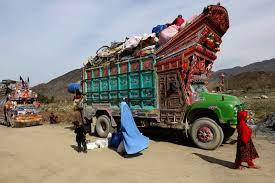ISLAMABAD (Reuters): Pakistan’s threat to forcibly expel illegal Afghan immigrants is “unacceptable,” a spokesman for the Taliban administration in Kabul said on Wednesday, adding that Afghans were not to blame for Pakistan’s security problems.
Estimating that there were 1.73 million Afghan immigrants living in Pakistan without any legal status, Pakistan’s caretaker government on Tuesday set a Nov.1 deadline for them to leave or face forcible expulsion.
“The behavior of Pakistan toward Afghan refugees is unacceptable,” Zabihullah Mujahid, the spokesman for the Taliban administration in Kabul, said in a post on the social media platform X, formerly known as Twitter.
To help justify the crackdown, Pakistan’s Interior Minister Sarfraz Bugti alleged that Afghan nationals had carried out 14 out of 24 suicide bombings in Pakistan this year.
The Taliban spokesman rejected that claim.
“The Pakistani side should reconsider its plan. Afghan refugees are not involved in Pakistan’s security problems. As long as they leave Pakistan voluntarily, that country should tolerate them,” Mujahid said.
Pakistan’s ultimatum to the immigrants, most of whom have been living in the country for years, came after a meeting of civil and military leaders to review the law and order situation following two suicide bombings on Friday that killed at least 57 people. Bugti said one of the suicide bombers was an Afghan national, and he also accused India’s intelligence agency of involvement.
Relations between the Taliban and the Pakistan government have deteriorated markedly, with border clashes temporarily closing the main trade route between the neighbors last month.
Islamabad alleges that the militants use Afghan soil to train fighters and plan attacks inside Pakistan. The Taliban denies those accusations, saying Pakistan’s security problems are home-grown.
A caretaker government was installed in August to guide the Pakistan through to elections expected sometime in the coming months, and the military has been able to exert more influence as a result of the uncertainty and instability in the country.







